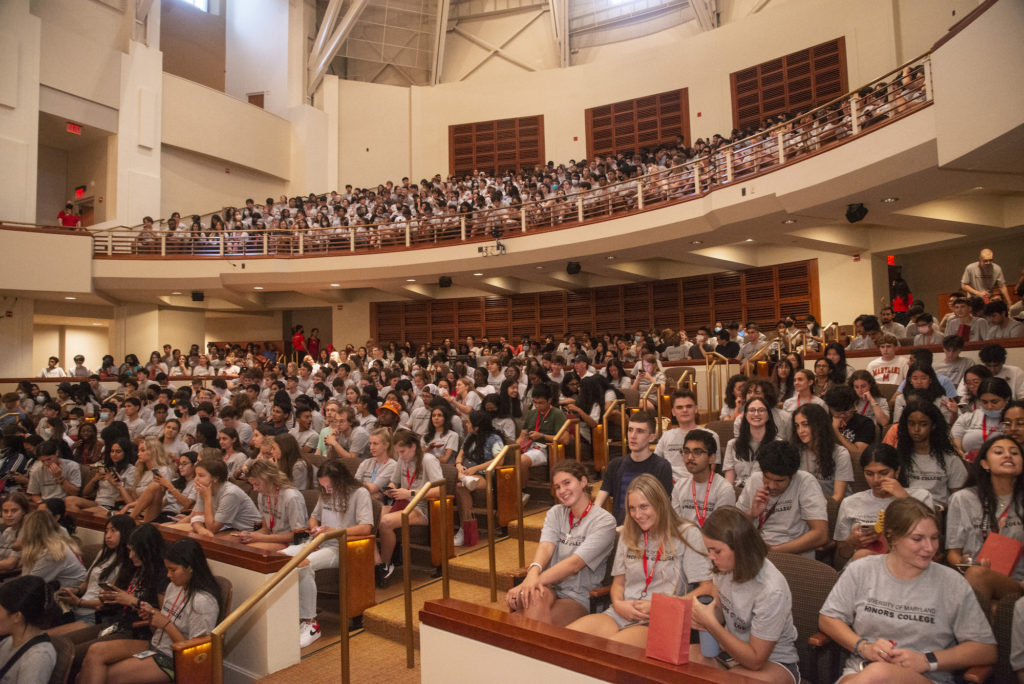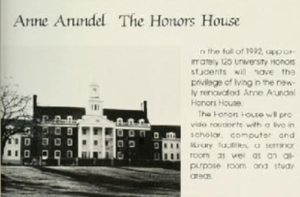Honors College History

History of the Honors College
The University of Maryland Honors College has a rich history spanning over five decades, evolving from its humble beginnings as a General Honors Program in 1966 to the comprehensive Honors College it is today. This timeline traces the development of honors education at UMD, highlighting key milestones, program expansions, and leadership changes that have shaped the college’s growth and impact on academic excellence.
Early Honors Programs
In 1938, the first proposal for Honors in English was passed by an administrative board, marking the earliest recorded discussion of honors education at the University of Maryland. Over the next two decades, various honors initiatives emerged:
- 1949: First Meeting of Honors Committee; approval for Special Honors in Literature
1953: Harold F. Cotterman suggested resuming honors program proposal reviews
1954: Inaugural Honors and Awards ceremony held at the Tunnel Amphitheatre
1958: Dean of the Faculty, R. Lee Hornbake began correspondence with ICSS (Inter-University Committee on the Superior Student, a national coordinating group of collegiate honors educators) and other universities about honors programs
1958 (letter dated June 17): Hornbake invites faculty to a meeting on developing honors programs
1962: The University Senate approved Honors Programs for the College of Arts and Sciences
1963: 13 formalized departmental honors programs announced


General Honors Program, 1966-early 1990s
The General Honors Program (GHP) began in 1966 within the College of Arts and Sciences with Dr. John Portz as its first director. Dr. Portz had also served as director of the English departmental honors program. Originally located in Francis Scott Key Hall, GHP was later housed (late 1970s-1993) on the ground floor of the R. Lee Hornbake Library, which was constructed in 1972 and named in 1980 in Hornbake’s honor, the Vice President for Academic Affairs.

General Honors and University Racial Integration
In the 1960s, as student organizers pressured universities to fully include Black students, they advocated for full inclusion in honors programs. A group known as the Congress of Racial Equity (CORE) “sought racial desegregation at the university… [and] struggled mightily in 1966 and early 1967 against…white indifference concerning race relations at the University of Maryland” (Andrea Levy, “Meeting the challenge of diversity 1968-1976: The Intensive Educational Development Program and change at the University of Maryland,” Chapter 2, 2010). CORE charged that university President Wilson Elkins ignored Black student concerns. The organization’s president, Earl Wynn, pushed Elkins to step up integration, Black history courses, and recruitment, among other concerns. At the time, the university was not well regarded as a race-friendly campus, and for this:
“Black students did not often consider the University…. College-bound Black high school graduates…were more likely to attend one of the [state’s four HBCUs]…. Maryland’s higher education system…was as racially segregated as it had been before the 1954 Brown…decision.” (Levy, Chapter 2, 2010)
According to a Diamondback student newspaper article on April 26, 1968, CORE pressured the university to recruit Black honors students. President Elkins was quoted as saying, “We only recruit athletes.” Portz then corresponded with Elkins welcoming the opportunity to recruit Black honors students. Portz was ahead of the institution’s official progress but his efforts were undoubtedly part of an accumulating effect. In the early 1970s, the campus began to support the recruitment of Black students.
It became clear that the University would have to place greater emphasis on minority student recruitment. Prior to 1970, there had been no formal mechanism for bringing African American students into the pool of applicants for admission to undergraduate status. Targeted recruitment had been left to CCAR [Campus Coalition Against Racism] students and IED [Intensive Educational Development] program staff. This began to change in 1970-71 when, in partial implementation of the University’s desegregation plan, “two full-time recruiters were hired by the Admissions Office specifically to recruit Black students…” (Levy, Chapter 3, 2010).
Portz also suggested to Elkins in his correspondence that the University set aside several honors scholarships for Black students. In addition to this, he promised that the Honors Student Council would contribute $500 annually to the scholarship fund to be given to Black high school graduates admitted to the General Honors Program. As Director, Portz and his wife, Edythe (who, according to records, was not a university staff or faculty member but appeared to be deeply involved with the program) contributed personal funds to support scholarships for Black honors students.
The Honors Student Council also agreed to assist in recruiting Black honors students. In reaching out to and having conversations with the CORE faculty advisor, Portz announced offering honors seminars that emphasized Black history and culture. President Elkins agreed that of the approximately 30 scholarships awarded to National Merit Finalists, five would be held for Portz to award to incoming Black honors students (May 2, 1968).
These efforts led to a community of academically gifted Black student leaders on the campus. Ted Laster was the first president of the Black Honors Caucus (BHC), a student organization composed of Black students in Honors. The BHC, founded in 1971 took up the role of recruiting and retaining Black students for Honors with its own student-run efforts to raise scholarship monies. The organization hosted a concert in the University’s Cole Field House Student Activities Building to raise scholarship money by bringing to campus the then very popular and heartthrob family music R&B band, The Jackson 5 (July 1971), and later the Queen of Soul, Aretha Franklin.

According to Andrea Levy, although Black students represented not even 5 percent of the student population, the Black Honors Caucus was among a few critically high-impact organizations by Fall 1972 that were “affect[ing] the University’s mission and programs” (2010). Some others were the Black Student Union, the Black Resident Assistant Caucus, and the Gospel Choir.
University Honors Program
In 1987-88, Nelson Markley, professor of mathematics, chaired the Markley Committee which had as its charge to systematically evaluate the current General Honors Program and to make recommendations on how the campus could improve and reinvigorate Honors on the campus. The Committee disseminated a preliminary report in August 1988 according to an October 10, 1988, Outlook article, “Honors Program Awaits Campus Discussion.” Academically housed under the Dean for Undergraduate Studies, the then Acting Dean Gerald Miller charged the committee with its task.

The August draft report was distributed to “student organizations, the Executive Council and Committee Chairs of the General Honors Program, the Advisory Committee on General Honors, directors of departmental honors programs, and the Dean’s Council” (T. Otwell, “Honors program awaits campus discussion,” Outlook, October 10, 1988). According to the October article, the draft proposed that the Honors program would (paraphrased):
- Include students who were in departmental honors programs;
- Develop an academic community through seminars, a dedicated residence hall, a common lounge, and social activities;
- Grant honors citations to graduates;
- Would serve as a high-profile entity on campus and an admissions beacon in guiding talented students to campus;
- Establish a faculty and staff council to advise the director;
- Delineate in a two-tiered structure—a two-year program for incoming freshmen and sophomores and an upper-level honors experience (departmental honors) for juniors and seniors.
This led to a shift in the structure of honors education on the campus as well as an intentional partnership with Student Affairs/Resident Life in the establishment of a new honors living and learning center that housed students in the renovated Anne Arundel Hall, which opened in Fall 1992. In 1996, two living-learning programs were established under the University Honors Program umbrella: Gemstone and Honors Humanities.
Transformation to the Honors College
In 2009, the University Honors Program underwent a significant transformation, expanding into the Honors College under the vision of Provost Nariman Farvardin. This change aimed to attract top academic talent nationally and internationally. The newly established Honors College encompassed multiple thematic living-learning programs, including:
- Digital Cultures and Creativity (DCC)—now called Design Cultures and Creativity—and Entrepreneurship and Innovation (EIP) programs, both launched in 2010. EIP closed in Spring 2021.
- Integrated Life Sciences (ILS) program, introduced in 2011.
- Advanced Cybersecurity Experience for Students (ACES) program, added in 2013.
The Honors College’s expansion marked a new era of specialized, interdisciplinary honors education at the University of Maryland.
Per recommendations of the 2017 Honors Strategic Revision Report, what was the umbrella campus-wide Honors program—University Honors Program—became University Honors, a stand alone living-learning program with its own distinct staff and curriculum similar to that of the other LLPs under the auspices of the Honors College.
More Recent Program Additions
In 2022, the Honors College expanded its offerings with two new programs: Interdisciplinary Business Honors (IBH) and Honors Global Communities (HGLO). These additions further diversified the college’s interdisciplinary approach, providing students with specialized tracks in business and global studies, respectively. The expansion reflected the college’s commitment to adapting its curriculum to meet evolving academic and professional demands. In Fall 2024, university Provost Jennifer King Rice officially changed the full name of HGLO to Honors Global Challenges and Solutions to further reflect the program’s focus on utilizing data science to address and identify solutions to global challenges.

Additionally, in 2013, the Honors College began participating in the annual Honors Education at Research Universities conference, signaling its engagement with broader discussions and developments in honors education across the country.
Honors College Directors
Directors of the University-Wide Honors Program at the University of Maryland:
General Honors Program
- John Portz, 1966-1978, First Director*
- John Howarth, 1978-1988
- Richard McCuen, Spring 1989, Acting Director
University Honors Program
- Carolyn Boyd, 1989-90
- Terry M. Parssinen, Summer 1990-Summer 1992
- Jane Lawrence 1992-1994, Acting Director
- Maynard “Sandy” Mack, Jr., 1994-2004
- Barbara Thorne, 2004-2008
Honors College
- Bill Dorland, 2009-2015
- Susan Dwyer, 2016-2020
- Peter Mallios, 2020-2024
- Kristy Maddux, 2024-present
*Dr. Portz, professor of English and director of the College of Arts and Sciences Departmental Honors program, was the first director of the General Honors program and has often been affectionately described as the founding director of the General Honors Program. However, in the late 1950s through to the early 1960s, Dr. R. Lee Hornbake, the Dean of the Faculty and later Academic Vice President, was the instrumental lead in developing a university-wide honors program at the University of Maryland.
Honors College history archival research by Dr. Traci Dula.
